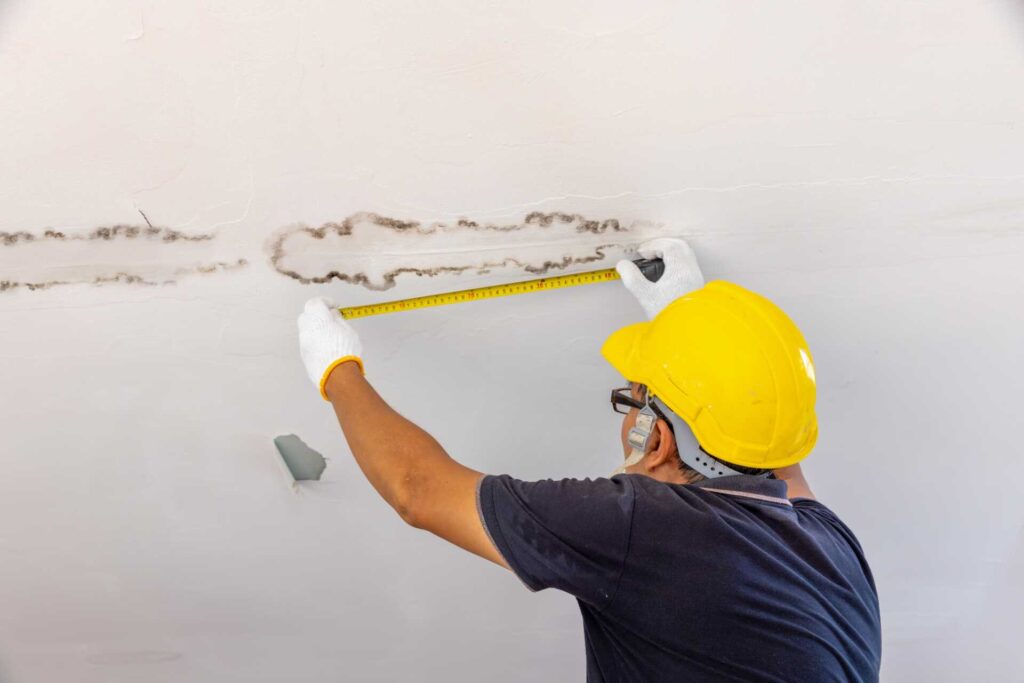
Contents
When safeguarding your home against water leaks, being proactive is key. By honing in on a few cost-effective techniques, you can potentially save yourself from the headache of extensive water damage. From subtle clues to innovative tools, there are ways to detect leaks without breaking the bank. So, why not equip yourself with the knowledge needed to protect your home and your wallet from unexpected water-related mishaps?
Key Takeaways
- Conduct regular visual inspections for water stains and mold growth.
- DIY pressure testing can be used to detect leaks by monitoring pressure drops.
- Consider installing smart sensors for real-time leak detection alerts.
- Research affordable professional leak detection services in your area.
- Prevent future leaks with routine plumbing maintenance and insulation.
Common Signs of Water Leaks
Water leaks can cause significant damage if left undetected. One common consequence of water leaks is water damage, which can lead to mold growth, structural weakening, and costly repairs.
Pipe corrosion is a frequent culprit behind water leaks. Corrosion weakens the pipes, making them prone to leaks and bursts. It’s essential to be vigilant for early signs of water leaks to prevent extensive damage to your property.
One of the key indicators of a water leak is the presence of water stains on walls, ceilings, or floors. These stains may appear as discolored patches or watermarks, signaling a leak behind the surface.
Musty odors can also indicate hidden water leaks, as stagnant water promotes mold growth and produces a distinct smell. Another sign to watch out for is the sound of running water when no faucets are turned on, suggesting a hidden leak within the walls or underground.
Increased water bills without a corresponding increase in usage can point toward a concealed water leak. Monitoring your water bill for unusual spikes can help you catch leaks early and prevent further damage.
Additionally, decreased water pressure in faucets or showers may indicate a leak affecting the water flow. Being attentive to these common signs can help you detect water leaks promptly and mitigate potential water damage.
DIY Water Leak Detection Methods
When identifying potential water leaks in your home, utilizing DIY water leak detection methods can be a cost-effective approach. Two common DIY methods for detecting water leaks are visual inspection and pressure testing.
DIY Water Leak Detection Methods
Visual Inspection
One of the simplest ways to detect water leaks is through visual inspection. Look for signs such as water stains on ceilings or walls, peeling paint, musty odors, or mold growth. Check under sinks, around toilets, and near appliances like the dishwasher or washing machine for any visible signs of water leakage.
Pressure Testing
Pressure testing involves checking your plumbing system for leaks by pressurizing it and monitoring for any drop in pressure. You can do this by shutting off all water sources, attaching a pressure gauge to a spigot, and pressurizing the system. If the pressure drops over time, it could indicate a leak in your plumbing system.
| DIY Method | Description |
|---|---|
| Visual Inspection | Look for visible signs of water leaks such as stains, odors, or mold growth. |
| Pressure Testing | Pressurize the plumbing system and monitor for any drop in pressure. |
Utilizing Technology for Leak Detection
To enhance your water leak detection capabilities beyond traditional methods, consider integrating advanced technologies into your approach.
Smart sensors play an essential role in detecting leaks early on by monitoring water flow and detecting abnormalities in usage patterns. These sensors can be installed at key points in your plumbing system to provide real-time data on water consumption and potential leaks.
Additionally, mobile apps paired with these smart sensors allow you to receive instant alerts on your smartphone or tablet if a leak is detected.
These apps provide detailed information on the location of the leak, the severity, and steps to take to address the issue promptly. Some apps even offer remote shut-off capabilities, allowing you to turn off your water supply from anywhere using your mobile device.
Hiring Professional Leak Detection Services
Enhance your leak detection efforts by entrusting the expertise of professional leak detection services.
When considering hiring professionals for leak detection, it’s vital to weigh cost considerations and conduct service comparisons to ensure you’re receiving the best value for your investment.
Cost considerations play a significant role in choosing professional leak detection services. Compare quotes from different providers to understand the average cost in your area.
While cost is important, it shouldn’t be the sole determining factor. Look for a balance between affordability and quality of service.
Service comparisons are essential when selecting a professional leak detection company. Research the reputation of each service provider, read reviews, and ask for recommendations.
Look for companies with a proven track record of accurately detecting and efficiently repairing leaks.
Additionally, inquire about the techniques and equipment used by each service provider. Advanced technology can lead to more precise leak detection, potentially saving you time and money in the long run.
Ensure the company you choose has certified professionals who are experienced in handling a variety of leak detection scenarios.
Preventing Future Water Leaks
Utilize proven preventative measures to safeguard your property against future water leaks. Regular maintenance is essential in preventing potential water leaks.
Conduct routine inspections of your plumbing system, checking for any signs of wear and tear such as corrosion, rust, or loose fittings. Addressing these issues promptly can help prevent leaks from occurring.
Another effective way to prevent future water leaks is by investing in pipe insulation. Insulating your pipes can help protect them from extreme temperatures, reducing the risk of cracks and leaks due to freezing or expanding pipes.
Make sure to insulate both hot and cold water pipes, especially those located in unheated areas like basements, attics, and crawl spaces.
Additionally, consider installing leak detection devices that alert you to leaks or moisture buildup in your home. These devices can provide early warnings, allowing you to take immediate action and prevent extensive water damage.
Wrap-Up
By implementing budget-friendly water leak detection methods, you can save yourself from costly repairs and prevent potential water damage in your home. For example, imagine coming home from vacation to find a burst pipe that has flooded your entire basement. By utilizing simple DIY techniques and smart sensors, you can detect leaks early and avoid such disasters. Stay proactive and protect your home from water leaks today.
Recent Posts
Mastering Biohazard Sewage Cleanup Techniques
Is it really worth the risk to tackle biohazard sewage cleanup without the right techniques?
Top Leak Detection Services for Homeowners
Is it true that most homeowners underestimate the impact of undetected leaks? You might think
What Are Effective Sewage Cleanup Solutions?
You might not realize that improper sewage cleanup can lead to long-term health risks and

